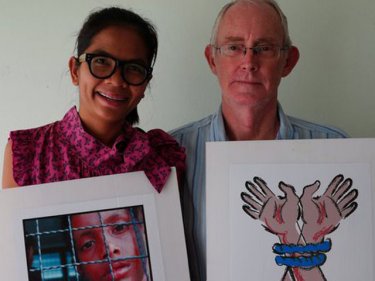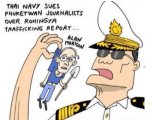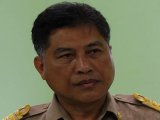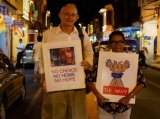Alan Morison, editor of Phuketwan, said today that he was grateful to the court for showing compassion.
Facing criminal defamation charges initiated by the Royal Thai Navy, Morison has until February 9 to make the trip and return the passport to court officials.
Morison says the charges, over republication of a 41-word paragraph from a Reuters report on the Rohingya exodus that won a Pulitzer Prize, are unjust.
He is still hoping for public support from the Australian Government to make the point that the military suing the media is an assault on Thailand's democratic freedoms.
''It says a lot about officials in Canberra that they declined to help me get my passport back,'' Morison said today. ''And the Foreign Minister has yet to clarify what she meant when she said last month that I needed to apologise - for something I haven't done.''
By coincidence, Lawyers' Rights Watch Canada on Monday urged Ms Bishop and Australia ''to intervene to ensure the rights to liberty, fair trial and due process'' in the case targetting Morison and a Phuketwan colleague, Chutima Sidasathian.
A letter from the Canadian lawyers, who promote human rights and the rule of law, explained that the group ''is of the opinion that Mr Morison's fair trial rights are being systemically violated.''
Morison and Khun Chutima today welcomed the letter, which adds to support already received from the UN human rights body, Amnesty International, the International Commission of Jurists, Reporters Without Borders, Human Rights Watch, the Committee to Protect Journalists and other international rights groups.
''It's an excellent letter because it expresses so clearly why the case is wrong and why the Australian government should be speaking out rather than parroting what Thai officials tell them to say,'' Morison said today.
''We have done nothing wrong. All we want is a fair trial in Thailand.''
Morison said his father's condition continues to deteriorate. ''Dad is now confined to bed and can no longer stand unaided. It's still a race against time to get to Australia,'' he said.
''My family and friends in Australia and in Thailand have been wonderfully supportive. The only interested party lacking an understanding of the principles being violated here is the Australian Government.''
Judicial Harassment in Thailand and Consular Protection of Mr Alan Morison
The Hon Julie Bishop MP
Minister of Foreign Affairs
Australian Government
House of Representatives
Parliament House
PO Box 6022
Canberra ACT 2600 Australia
Fax: +61 2 6273 4112 ;
Email: Julie.Bishop.MP@aph.gov.au;
phillip.stonehouse@dfat.gov.au; Lance.Truong@dfat.gov.au
The Hon Andrew Robb AO MP
Minister for Trade and Investment
PO Box 6022
House of Representatives
Parliament House
Canberra ACT 2600 Australia
Fax: +61 2 6273 4128;
Email: Andrew.Robb.MP@aph.gov.au
H.E. Paul Robilliard
Ambassador to Thailand
Australian Embassy, Thailand
37 South Sathorn Road
Bangkok 10120 Thailand
Fax: 66-02 344 6593;
Email: sarah.roberts@dfat.gov.au; Trudy.McGowan@dfat.gov.au
Dear Ministers and Ambassador,
Judicial Harassment in Thailand and Consular protection of Mr. Alan Morison, Journalist, Human Rights Defender and Australian Citizen.
Lawyers' Rights Watch Canada (LRWC) is a committee of Canadian lawyers who promote human rights and the rule of law through advocacy, education and research. LRWC is an NGO in Special Consultative Status with the Economic and Social Council (ECOSOC) of the United Nations (UN).
LRWC deplores the wrongful prosecution in Thailand of Mr Alan MORISON and Ms Chutima SIDASATHIAN, journalists with Phuketwan, a newspaper based in Phuket Province in Thailand.
These two journalists have for several years researched and written about the plight of and human rights violations against stateless persons and Rohingya people from Burma. For this work, Mr Morison and Chutima Sidasathian have received several awards, including a 2010 Award for Excellence in Human Rights Reporting from the Society of Publishers in Asia (SOPA).
Journalists who investigate and report human rights issues are recognized as human rights defenders in accordance with the definition of ''human rights defenders'' of the United Nations (UN) Office of the High Commissioner for Human Rights (OHCHR).
LRWC believes the intervention of the Australian government is necessary to ensure adequate protection of Mr Morison's internationally protected rights, including rights protected by the International Covenant on Civil and Political Rights (ICCPR), ratified by Australia in 1980 and by Thailand in 1996, and the UN Declaration on Human Rights Defenders, adopted by consensus of the member States of the UN General Assembly in 1999.
Such intervention is in keeping the duties arising from the Vienna Convention on Consular Relations Article 5(a).
LRWC urges Australia to seek return of Mr Morison's passport, which on 17 April 2014 was confiscated by the Phuket Court in Thailand in violation of Australia's rights under customary international law.
Mr. Morison's internationally protected rights to a fair trial and liberty are also being violated. LRWC urges Australian officials to attend and observe all court proceedings involving Mr. Morison.
In support of these requests, we provide background facts and discussion of relevant international law.
LRWC is of the opinion that Mr. Morison's fair trial rights are being systemically violated in contravention of the ICCPR, the Universal Declaration of Human Rights (UDHR) and other international human rights law binding on Thailand.
Some particulars of these violations are:
The charges were brought against Mr Morison and his colleague, Chutima Sidasathian, by Thai authorities (the Royal Thai Navy) for the illegitimate purpose of punishing the lawful exercise of freedom of expression;
Thailand's criminal defamation laws and the Computer Crimes Act fail to meet international human rights standards in that they are vague, overly broad and impose disproportionately harsh criminal sanctions and contravene Thailand's domestic and international legal obligations to ensure that all persons within its territory can exercise their lawful right to freedom of expression without risk of criminal sanctions;
Thailand's judicial system is not currently capable of guaranteeing a ''hearing by a competent, independent and impartial tribunal'' as required by the ICCPR (Article 14) and the UDHR (Article 10);
Morison is being denied access to his passport, which is a denial of international human rights law regarding the presumption of innocence and pre-trial release; and
Morison and his colleague, Chutima Sidasathian, are being denied protection which is due to them as human rights defenders pursuant to the UN Declaration on Human Rights Defenders.
Background facts
On 18 December 2013, Alan Morison and Chutima Sidasathian appeared at the Wichit police station in Phuket province, Thailand, regarding charges of criminal defamation under section 328 of the Thailand Penal Code and charges under the Computer Crime Act, section 14 (1).
Thai authorities failed to provide Mr Morison with an interpreter at the police station, and Chutima Sidasathian had to interpret to Mr Morison.
These charges were laid by the Royal Thai Navy and relate to an article published by Phuketwan on 17 July 2013 entitled, 'Thai Military Profiting from Trade and Boat people, Says Special Report.'
The Phuketwan article quoted a brief excerpt from a Reuters report. Chutima Sidasathian had been hired by Reuters for several days to work on its coverage of the story.
In April 2014, Reuters won a Pulitzer Prize for the story, and, while the Royal Thai Navy made a police complaint against Reuters, no charges against Reuters have been laid.
The Reuters article was also quoted by several other Thai news outlets, none of which have been charged.
On 17 April 2014, Mr. Morison and Chutima Sidasathian were required to appear at the court house at Phuket. The charges were accepted by the court, and both Mr Morison and Chutima Sidasathian were granted pre-trial release on bail of 100,000 Baht each (estimated at approximately Australian $3320 at that time).
All discussions about the charges and pre-trial release took place in the Thai language with no interpretation provided to Mr Morison, so that he was unable to understand what was being said or the nature of the proceedings.
Prior to and during the pre-trial release hearing, they were detained for five hours in court cells, where they remained until bail was raised.
Mr Morison was detained in cells with 90 men in a crowded cell and Chutima Sidasathian was detained with nine other women.
Reportedly, an official from the prosecutor's office visited Chutima Sidasathian in the female cell and asked her if she and Mr Morison intended to plead guilty.
She conveyed to the official that they did not intend to plead guilty as they had done nothing wrong. No official paid a visit to Mr Morison's cell to ask his plea, but Mr Morison was presented with a document in Thai language and told he must sign it in order to be released from the cell.
He signed the document but did not know what it stated; he learned later that it was a confirmation that he pleaded not guilty.
Mr Morison does not consider that he has entered a plea in person to the court. Neither Mr Morison nor Chutima Sidasathian were present at the pre-trial release hearing itself, which, with the agreement of defence counsel, took place in a court foyer, not a courtroom due to overcrowding of the court after the Thai New Year long weekend.
The hearing was attended by Mr Morison's and Chutima Sidathatian's defence counsel as well as an observer from the Australian embassy.
Mr Morison was required to surrender his Australian passport prior to the hearing, and it was not returned to him, even though no evidence was provided to the court that Mr Morison was a flight risk.
Chutima Sidasathian was not required to surrender her Thai passport.
Mr Morison and Chutima Sidasathian appeared in court for a preliminary hearing on 26 May 2014 where lists of witnesses were exchanged but no evidence was heard. The trial is scheduled for 14-16 July 2015.
In early April 2014, Mr Morison and Chutima Sidasathian complained to the National Human Rights Commission (NHRC) that the Royal Thai Navy prosecution is a violation of their right to freedom of expression.
On 7 July, a mediation hearing was held by members of Thailand's NHRC with Mr Morison, Chutima Sidasathian and representatives of the Royal Thai Navy. Approximately 45 minutes of talks occurred in Thai, which Mr. Morison was unable to understand except for a five-minute opening in English.
After the mediation, a staff member of the NHRC on several occasions contacted Chutima Sidasathian and suggested that Phuketwan apologise to the Navy. The NHRC has provided no report on the matter.
In the meantime, without his passport, Mr Morison is unable to renew his work permit, which expires in February 2015. This may result in the closure of Phuketwan and loss of livelihood.
If found guilty of the Computer Crimes Act offence, Mr Morison and Chutima Sidasathian face imprisonment for up to five years and fines of up to 100,000 Thai Baht (estimated at approximately Australian $3700 as of December 2014).
On the offence of criminal defamation, they face imprisonment for up to two years and a fine of up to 200,000 Baht (approximately Australian $5400).
Mr Morison applied to Thailand's Ministry of Justice for legal aid, but the application was denied on 6 October 2014.
Reasons provided by the Ministry for denying legal aid did not address international law principles governing the right to legal aid but rather stated that that the information published by Phuketwan ''is false and untrue. The journalists must be correct and recheck their information before publishing the story to make sure there is no danger to others. The reputation of the Royal Thai Navy was damaged and made people look down on the Navy. On the evidence we have, we believe Morison and Khun Chutima did the wrong thing.''
Mr Morison applied to the Phuket court on 28 October 2014 for return of his passport, but the application was denied by the court's Deputy Director. Oral advice was provided that Mr. Morison was free to apply again to the court's Director.
An Australian consular official has written to Mr Morison's family member stating that Court officials advised that the request for passport return was denied because the request contained insufficient information, and that ''should Mr Morison provide through his lawyer full details of his planned travel, including departure and return dates, intended purpose and evidence of his links to Thailand, then they would consider returning his passport temporarily'' but that ''permanent return of Mr Morison's passport is not possible until his case has been concluded.''
Mr Morison had already provided the suggested information in his 28 October application to the Court. Given the pace of court proceedings and the possible sentence, permanent return of the passport could take years.
Mr Morison has been unable to return to Australia to visit his family. Mr Morison would like to visit his 91-year-old father who resides in [the electorate of] Barker, South Australia, and whose health is reported to be rapidly declining.
Need for consular protection of Australian human rights defender against unlawful prosecution
The charges appear to have been filed by Thai authorities as reprisals against Alan Morison and Chutima Sidasathian for exercising their freedom of expression to expose human rights violations against Rohingya people.
As such, the prosecution is illegitimate and contravenes Thailand's domestic and international legal obligations to ensure that all persons within its territory can exercise their lawful right to freedom of expression without risk of criminal sanctions.
The prosecution also indirectly affects the rights of victims to have the facts of violations made known and to secure remedies.
Violation of fair trial rights: Nullification of independence of the judiciary
The National Council for Peace and Order (NCPO) has ordered that courts must hear and adjudicate cases according to NCPO announcements.
The NCPO has also ordered the courts to avoid expressing opinions that could affect the functioning of NCPO.
These orders effectively strip courts of the independence and impartiality required by the ICCPR and thereby nullify fair trial rights.
In cases involving criticism of acts or omissions of the NCPO, such orders foreclose an effective defense.
On 22 May 2014, the NCPO issued Order No. 11/2557 which unlawfully suspended Thailand's Constitution and ordered that ''[a]ll Courts shall continue to function and adjudicate on cases as prescribed by the law and the Announcement of the National Peace and Order Maintaining Council.'' On 24 May 2014, by Order No. 33/2557, the NCPO ordered:
With regard to the Announcement of the NCPO (formerly NPOMC) No. 11/2557 dated 22 May 2557 on the termination of the Constitution of the Kingdom of Thailand, which stipulates that all Courts are to continue to hear and adjudicate cases according to the law and the Announcements of the NCPO, and which requires all independent organizations and other agencies established under the Constitution B.E. 2550 (2007) to continue to function as usual; in order to ensure conformity of public understanding and unity in resolving the political conflict peacefully, the NCPO asked that all Courts, independent organizations and other agencies refrain from expressing opinions which might create misunderstanding, confusion and polarization among the public such that it affects the functioning of the officers of the NCPO (emphasis added).
On 22 July 2014, an interim constitution was promulgated which subordinates international human rights and puts legislative, executive and judicial branches of government under NCPO control.
Section 3 purports to subordinate Thailand's international human rights treaty obligations to the interim constitution.
While section 26 of the interim constitution states that judges are independent, Sections 44, 47 and 48 place the NCPO's polices, practices and actions beyond the scrutiny of the courts. Such provisions contravene Article 2 of the ICCPR, which guarantees an effective remedy when rights are violated, including violations committed by persons acting in an official capacity.
Mr Morison's right to the presumption of innocence has been violated in at least two ways. First, his passport has been confiscated, reportedly without evidence that Mr Morison is a flight risk.
In international law, it is up to the prosecution to establish circumstances that would allow the court to legitimately restrict the defendant's liberty pending trial.
It now appears that Mr Morison is being asked to provide evidence that he is not a flight risk. Placing the onus on him to establish that he is not a flight risk is a violation of the presumption of innocence to which he is entitled.
Second, in its reasons for rejecting legal aid (set out above), the Ministry of Justice ignored the right to be presumed innocent and to a fair trial by making a statement prejudging guilt before any evidence has been heard by the court.
The NHRC, by suggesting that the parties apologize to the Royal Thai Navy for exposing serious allegations of human rights violations, ignored the presumption of innocence, the law governing the charges and State duties.
Once the Thailand court accepts a charge under the Computer Crime Act, no apology can halt the proceedings; rather, the court must adjudicate the matter. The suggestion of an apology also demonstrates misunderstanding of Thailand's duty under the Declaration on Human Rights Defenders, Article 2, to ensure protection of human rights defenders, including journalists, by taking ''all necessary measures to ensure the protection of everyone against , threats, retaliation, pressure or any other arbitrary action as a consequence of his or her legitimate exercise of the rights referred to in the Declaration.
Recently, the UN sub-committee on accreditation (SCA) of the International Coordinating Committee on National Human Rights Institutions (ICC) recommended that Thailand's NHRC be downgraded from its current status as compliant with UN Principles relating to the Status of National Institutions (Paris Principles), for several reasons, including serious concerns about lack of transparent and merit-based selection processes for Commissioners and concerns about NHRC staff's lack of independence and neutrality.
Thailand's criminal defamation legislation fails to meet international human rights standards
The criminal defamation laws under which the parties have been charged have been criticized as being used to silence critics and shield perpetrators of human rights abuses from accountability and prevent remedies for victims.
For example, the recent US Trafficking in Persons (TIP) report notes that the use of Thailand's criminal defamation laws ''to prosecute individuals for researching or reporting on human trafficking may have discouraged efforts to combat trafficking.''
In October 2011, the UN Special Rapporteur on the right to freedom of opinion and expression, Frank La Rue, called on the government of Thailand to ''hold broad-based public consultations to amend the 2007 Computer Crime Act so that [it is] in conformity with the country's international human rights obligations.''
During the 2nd Universal Periodic Review (UPR) of its human rights record in October 2011, Thailand received numerous recommendations to review the Computer Crime Act.
United Nations monitoring bodies have noted that criminal defamation laws contravene rights to freedom of expression and have called for repeal.
In 2005, the UN Human Rights Committee expressed concern about intimidation and restrictions on freedom of expression through defamation lawsuits in a number of countries.
In 2000, the UN Special Rapporteur on access to information, criminal libel and defamation, the police and the criminal justice system, and new technologies stated that:
Criminal defamation laws represent a potentially serious threat to freedom of expression because of the very sanctions that often accompany conviction. It will be recalled that a number of international bodies have condemned the threat of custodial sanctions, both specifically for defamatory statements and more generally for the peaceful expression of views.
The Special Rapporteur recommended that criminal defamation laws ''should be repealed in favour of civil laws as the latter are able to provide sufficient protection for reputations.''
Violation of the right of human rights defenders to be protected from retaliation
The prosecution of Mr Morison and Chutima Sidasathian is a misuse of criminal sanctions to punish ''the peaceful expression of views.''
Human rights defenders are entitled to conduct peaceful human rights research and writing and to be protected from retaliation including malicious prosecution and judicial harassment. The Declaration on Human Rights Defenders, adopted 9 December 1998 by consensus of the member States of the UN General Assembly, states that:
''everyone has the right, individually or in association with others, to promote the protection and realization of human rights and fundamental freedoms at the national and international levels'' (Article 12.1);
''everyone has the right, individually and in association with others, to participate in peaceful activities against violations of human rights and fundamental freedoms'' (Article 1);
''the State shall take all necessary measures to ensure the protection by the competent authorities of everyone, individually and in association with others, against any violence, threats, retaliation, de facto or de jure adverse discrimination, pressure or any other arbitrary action as a consequence of his or her legitimate exercise of the rights referred to in the present Declaration (Article 12.2); and
''[i]n the exercise of the rights and freedoms referred to in the present Declaration, everyone, acting individually and in association with others, shall be subject only to such limitations as are in accordance with applicable international obligations and are established by law solely for the purpose of securing due recognition and respect for the rights and freedoms of others and of meeting the just requirements of morality, public order and the general welfare in a democratic society'' (Article 17)
Both the criminal defamation law and the processes by which Mr Morison and Chutima Sidasathian are being prosecuted fall conspicuously short of Thailand's international obligations.
This is a clear case of de jure and de facto retaliation against Mr Morison and Chutima Sidasathian for their involvement in legitimate human rights journalism.
Further, the case is being prosecuted in full cooperation with police and military authorities, Ministry officials, court officials, prosecutors and judges in courts that are now subject to the dictates of the military junta.
Australia has a duty to ensure the protection of Mr. Morison's rights to liberty and fair trial as an Australian national and as a human rights defender.
Duty of Australia to intervene for protection of Alan Morison
Consular officials of Australia have advised Mr Morison that the embassy is ''unable to interfere in the legal affairs of a sovereign country.''
This statement is at odds with international law and with Australia's policy described in its Consular Services Charter,[29] which states that if citizens are arrested, consular will ''visit or contact you to check on your welfare, provide details of local lawyers and details of interpreters if required and do what we can to see you are treated fairly under the laws of the country in which you have been arrested.''
The laws of Thailand must be taken to include international law binding on Thailand. The policy statement that Australia ''cannot''. intervene in another country's court proceedings or legal matters including employment disputes, commercial disputes, criminal cases and family law matters or child custody disputes should not preclude consular protection of the internationally protected rights of an Australian human rights defender, nor should it preclude Australia's insisting on its sovereign right to possess its citizens' passports.
The International Court of Justice (ICJ) stated in 1924 that:
It is an elementary principle of international law that a State is entitled to protect its subjects, when injured by acts contrary to international law committed by another State, from whom they have been unable to obtain satisfaction through the ordinary channels.
By taking up the case of one of its subjects and by resorting to diplomatic action or international judicial proceedings on his behalf, a State is in reality asserting its own right - its right to ensure, in the person of its subjects, respect for the rules of international law.
While general principles of international law and customary international law normally require exhaustion of local remedies as a pre-condition for the exercise of diplomatic protection, there is no requirement that local remedies be exhausted when remedies available to the complainant would be ineffective or futile.
The NCPO abrogated judicial independence through the above-noted orders and imposition of the interim constitution, and as a result Thailand's courts cannot guarantee fair trial rights in accordance with international human rights standards.
Mr Morison has already been subject to violations of his fair trial rights. He stands charges with an offence that itself contravenes Thailand's legal obligations to protect the exercise of freedom of expression.
If convicted, Mr Morison faces the possibility of lengthy arbitrary detention.
The Australian government has a right to engage with Thailand to protect Mr Morison's rights; it also has a duty to do so.
Such a responsibility stems from the advancement over the past century of the human rights of the individual rather than the sovereign powers of the State. There is clear recognition of the duty of States to protect their citizens from violations of jus cogens norms such as freedom from arbitrary detention and the right to a fair trial including the presumption of innocence.
Mr Morison's fair trial rights have been and are currently being severely violated, and he is at risk of violation of the jus cogens norm protecting individuals from arbitrary detention.
A second reason the Australian government should intervene in this case stems from Mr Morison's status as a human rights defender experiencing reprisals for doing work that is internationally praiseworthy.
The former Ambassador, Mr James Wise, advised Mr Morison that:
''Normally, we take up issues like yours with our host government only after the person affected asks us to do so (especially when the case already has a high profile and we can be confident that the host government is aware of it). We would not want to cut across your own plans for managing the way you want to respond to the allegations against you because, ultimately, how you manage your affairs is your business, not ours.''
LRWC disagrees with the assessment that the prosecution of an Australian national in contravention of the international law obligations of the prosecuting state, is not Australia's business.
The Phuketwan report is just one of numerous allegations that Rohingya people and others are handed over to traffickers, who sometimes sell the men as indentured servants on farms or into slavery on Thai fishing boats.
Mr Morison is in need of consular protection to ensure that his legitimate and important work as a human rights journalist is not arbitrarily obstructed or silenced by proceedings that contravene international law obligations.
LRWC was pleased that the Australian embassy in Thailand sent an observer to Mr. Morison's court hearing on 17 April 2014.
LRWC was also pleased that on 31 May 2014, Australia responded to Thailand's 22 May 2014 military coup by announcing a reduction of its engagement with the Thai military, reviewing defence and other bilateral activities, preventing the coup leaders from travelling to Australia and calling on the military to ''set a pathway for a return to democracy and the rule of law as soon as possible, to refrain from arbitrary detentions, to release those detained for political reasons and to respect human rights and fundamental freedoms.''
However, Australia's 22 December 2014 message to Thailand, fails to mention the rule of law and international human rights.
Instead, Ambassador Robilliard emphasized Australia's positive and longstanding relationship with Thailand, including economic, educational, military and police cooperation.
On 22 December 2014, the Minister of Foreign Affairs, Julie Bishop, reportedly stated to Mr. Morison's family member that Mr Morison had not had his passport returned because he had not ''met the conditions including apologizing.''
The suggestion that an apology by Mr Morison to the Royal Thai Navy would be appropriate is disturbing in light of Article 2 of the Declaration on Human Rights Defenders which requires State protection of Mr Morison from threats, retaliation or pressure as a consequence of his legitimate responsibilities as a human rights journalist and defender.
LRWC urges the Australian government to:
urgently seek the return to Australia of Mr Morison's passport and provide active support for any concomitant application by Mr Morison for amendment of his pre-trial release, making arguments as necessary to the court based on international law that the Australian government does not consent to the impoundment of the passport by Thailand authorities and insisting that all of Mr Morison's rights as a human rights defender be fully respected;
take action to ensure that the fair trial and due process rights of Mr Morison are adequately protected in Thailand;
send embassy representatives to attend and observe all court appearances and hearings Mr Morison or his lawyers are required to attend.
LRWC also urges the Australian government to engage with the NCPO to advocate that Thailand authorities:
immediately cease all reprisals, including prosecutions, against Mr Morison and Chutima Sidasathian;
comply with the ICCPR, UDHR and the Declaration on Human Rights Defenders;
restore full independence of prosecutors and judges;
restore and ensure the protection of all other international human rights binding on Thailand, including fair trial rights, the presumption of innocence and international standards of pre-trial release;
fulfil the recommendations made by the UN SCA of the ICC to ensure that Thailand's National Human Rights Commission complies with the Paris Principles; and
restore democratic rule through free and fair elections.
We look forward to your early reply.
Sincerely,
Gail Davidson, Executive Director, LRWC
Fully notated version at:
http://www.lrwc.org/australia-judicial-harassment-in-thailand-and-consular-protection-of-mr-alan-morison-letter/















The last thing you should worry about right now, is that defamation case. Get some quality time with your dad, 'cause that's what's more important than all that other bureaucracy mumbo jumbo.Have a safe flight and may all the strength be with you and your family.
Posted by Carl on January 7, 2015 09:58